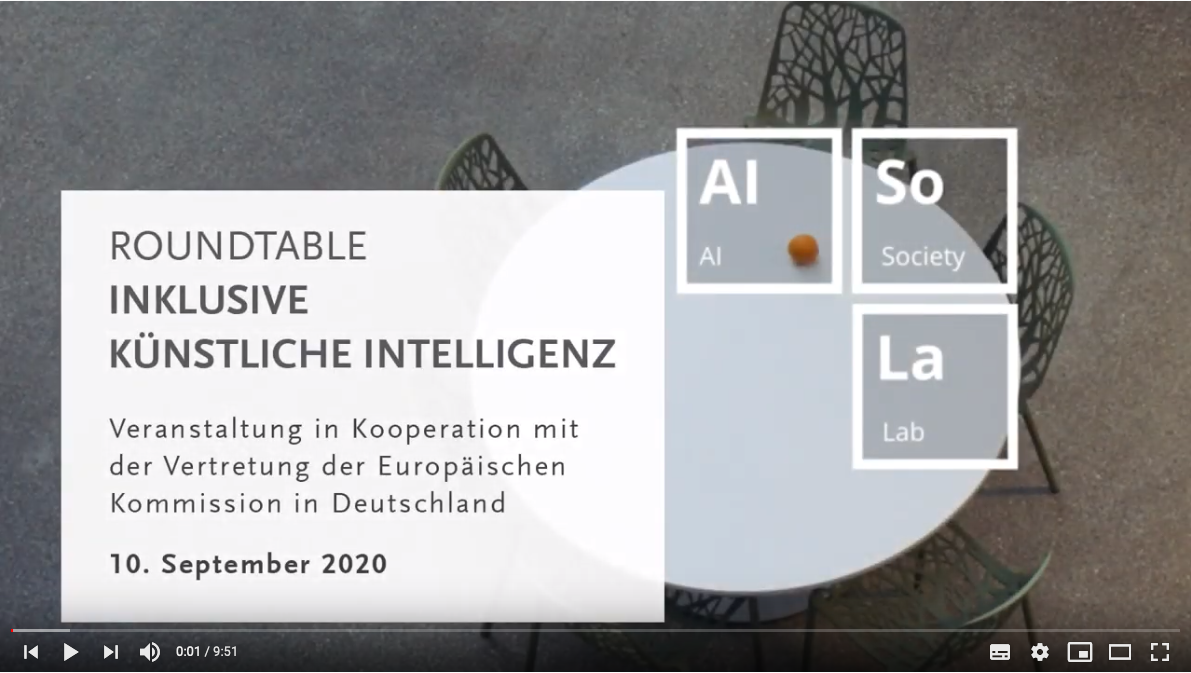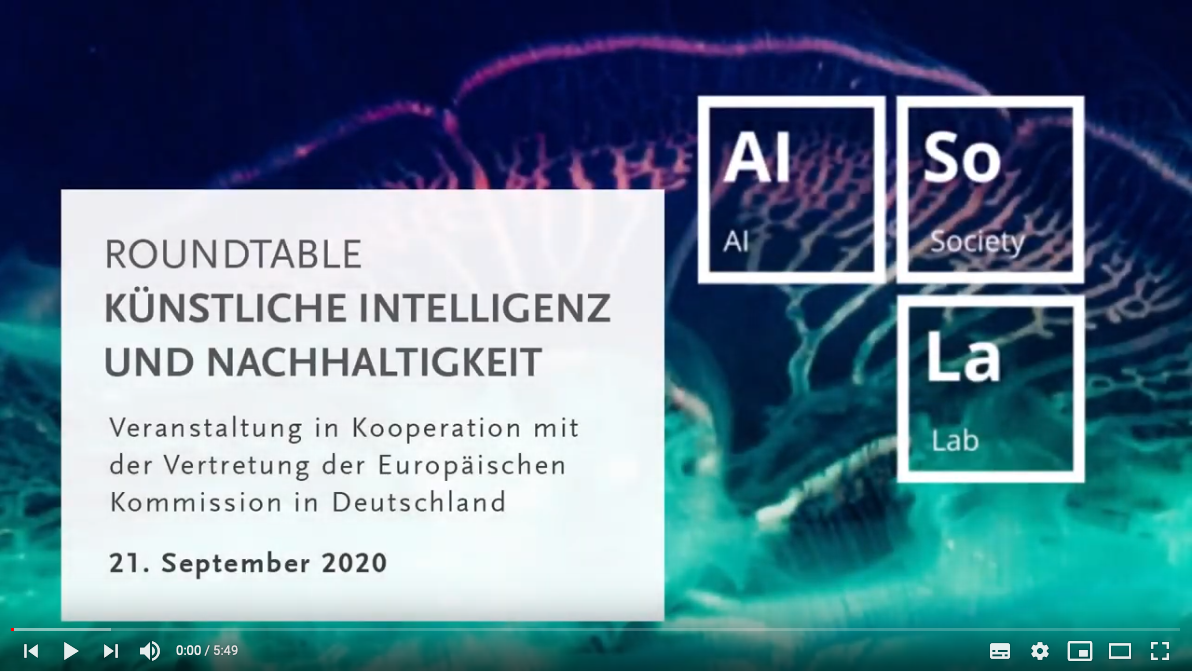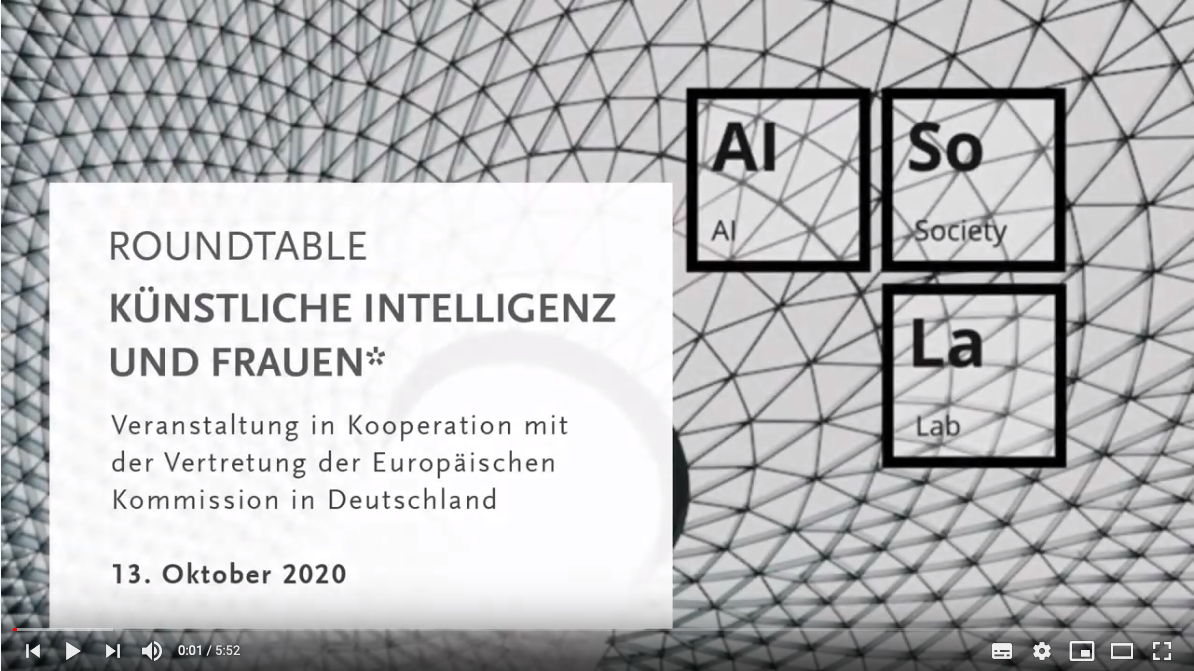Unsere vernetzte Welt verstehen

Roundtable-Dialoge für die Zukunft der KI in Europa
Wege zu einer exzellenten europäischen KI, die Grundrechte und das Gemeinwohl fördert
Mit der Veröffentlichung des Weißbuchs zur Künstlichen Intelligenz im Februar 2020 hat die Europäische Kommission einen breit angelegten Konsultationsprozess gestartet und Schlüsselfiguren der Zivilgesellschaft, Industrievertreter*innen sowie Forschende eingeladen, Vorschläge für einen europäischen Ansatz zu KI einzubringen. In diesem Zusammenhang veranstaltete das AI & Society Lab am Alexander von Humboldt Institut für Internet und Gesellschaft gemeinsam mit der Vertretung der Europäischen Kommission in Deutschland eine Reihe von Roundtables. Vier Veranstaltungen brachten verschiedene Expert*innen und Praktiker*innen aus unterschiedlichen Bereichen zusammen, um ihre Perspektiven, Bedenken und Vorschläge in einem Dialog zu den im Weißbuch angesprochenen Themen zu teilen.
European digital infrastructure – a solid foundation for European values
The first edition of this roundtable series revolved around the topic of AI, the Internet of Things (IoT) and the concept of decentralised data, with discussions on the status quo and pitfalls of this approach. Malte Beyer-Katzenberger from the EU Commission underlined that “decentralisation is a must” for Europe to become the “global hub for data” (White Paper on AI, p. 25). According to Vanessa Cann, managing director of the German Federal AI Association, European projects such as GAIA-X should become “more than just an infrastructure” in this context and could offer services as well as APIs in order to become attractive. The roundtable participants argued that necessary measures still have to be agreed on in order to realise these potentials, while safeguarding digital and fundamental human rights at the same time. Underlying, broader concepts such as productivity or security and their implications will have to be re-negotiated, while open data approaches are thought to have great potential for safeguarding digital human rights – provided that these data sets are as diverse as the teams working with them. Building AI with open AI tools, together and in a bottom-up manner could be “a great chance to tackle societal problems together”, said Dr. Stefan Ullrich of the Weizenbaum Institute.

Inclusive AI – leaving no one behind
A central suggestion by the White Paper is the risk-based approach for regulation. One field “considered as high-risk” (p. 18) is the field of human resource management. The starting point of our second roundtable on inclusive AI was the realisation that citizens, workers as well as anti-discrimination advice centres and other bodies often do not understand how the systems they use work and whether they potentially present a source of discrimination. Various participants argued that a “strong right to information” and transparency obligations should therefore be reflected in the European legal framework that so far still lacks “regimes for transparency, traceability and human oversight” (p. 9). Rather than focusing on high-risk cases or sectors, Carla Hustedt of the Bertelsmann Stiftung suggested that it might be more helpful to define additional criteria for “identifying the cases within sectors that are really problematic”. Just like technological progress, legal advancements should be “inseparably linked to a broad societal debate about norms and to the protection of democratic values”, especially outside the global North, urged Jaana Müller-Brehm of iRights.Lab.

AI and sustainability – growth vs. the environment?
In our third roundtable on AI and sustainability we aimed to shed light on the question whether AI can be a “critical enabler” (p. 2) to “tackle the most pressing concerns, including climate change and environmental degradation” (p. 5), or not. For Dr. Marc Schattenmann from the Federal Ministry for Environment, a trustworthy European AI “must also be sustainable AI”, suggesting that policies and regulation must feature environmental and climate protection “everywhere as a cross-cutting issue”. In order to “make AI itself more sustainable” (Björn Juretzki, EU Commission), experts underlined the need for sustainability regarding both products and services and discussed ideas such as the introduction of a Green AI label. In addition to that, Uta Mühleis (RESET.org) emphasised that energy consumption “must be kept within limits”. Anchoring sustainability at the core of business models and linking it closely to profitability could be one approach to achieve this.

Diversity – uniting and moving Europe forward
As the High Level Expert Group on AI declared: diversity and inclusion must play an essential role for the development of AI applications. In our fourth roundtable, we examined the status quo of women in the field of AI and tech in general. Women are still underrepresented in the tech-domain. One hindering issue for women’s success is certainly the lack of female role models and diverse success stories, as Tina Nord (ultimate.ai) pointed out. In the follow-up of this roundtable, we compiled a position paper (in German only), identifying the biggest challenges for women in AI and tech and discussed possible future steps. The paper presents the key claims as formulated by the participants, such as: “AI visions and strategies also need to include intersectional perspectives” and “Societal challenges call for societal discourses – not for technical solutions”. It’s available for download on our website.

Together for AI for the common good
In the coming years, the AI & Society Lab, as well as the newly established research group on Public Interest AI, will keep on building networks around the topics the roundtables have addressed and around other related topics. In the spirit of experimentation, creativity and cooperation, we will continue to conduct research in a practical and application-oriented manner while fostering dialogues between politics, industry and civil society. Anyone with further inquiries or socially relevant questions revolving around these topics is very welcome to get in touch with us.
Dieser Blogbeitrag erschien zuerst am 26. Februar 2021 auf den Futurium-Seiten der Europäischen Kommission und wird hier mit freundlicher Genehmigung veröffentlicht
Dieser Beitrag spiegelt die Meinung der Autorinnen und Autoren und weder notwendigerweise noch ausschließlich die Meinung des Institutes wider. Für mehr Informationen zu den Inhalten dieser Beiträge und den assoziierten Forschungsprojekten kontaktieren Sie bitte info@hiig.de

Jetzt anmelden und die neuesten Blogartikel einmal im Monat per Newsletter erhalten.
Künstliche Intelligenz und Gesellschaft
Netzecho: Reaktionen auf die Tagesschau in Einfacher Sprache
Seit 2024 gibt es die Tagesschau in Einfacher Sprache. Wie wird das neue Nachrichtenformat von Nutzer*innen im Internet diskutiert?
Chancen gegen Einsamkeit: Wie Pflegeeinrichtungen das Quartier vernetzen
Was hilft gegen Einsamkeit im Alter? Pflegeeinrichtungen schaffen neue Räume für Gemeinschaft und digitale Teilhabe.
Unfreiwillig nackt: Wie Deepfake Porn sexualisierte Gewalt gegen Frauen verschärft
Deepfake Porn nutzt KI, um täuschend echte Nacktbilder ohne Einwilligung zu erzeugen, meist von Frauen. Wie können wir Betroffene besser schützen?





